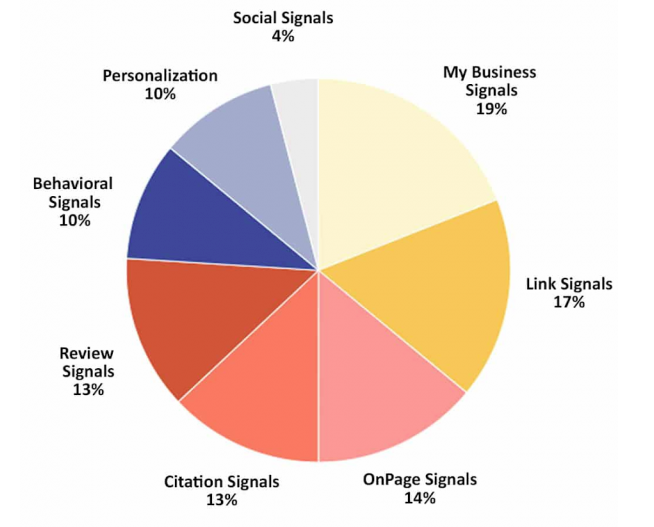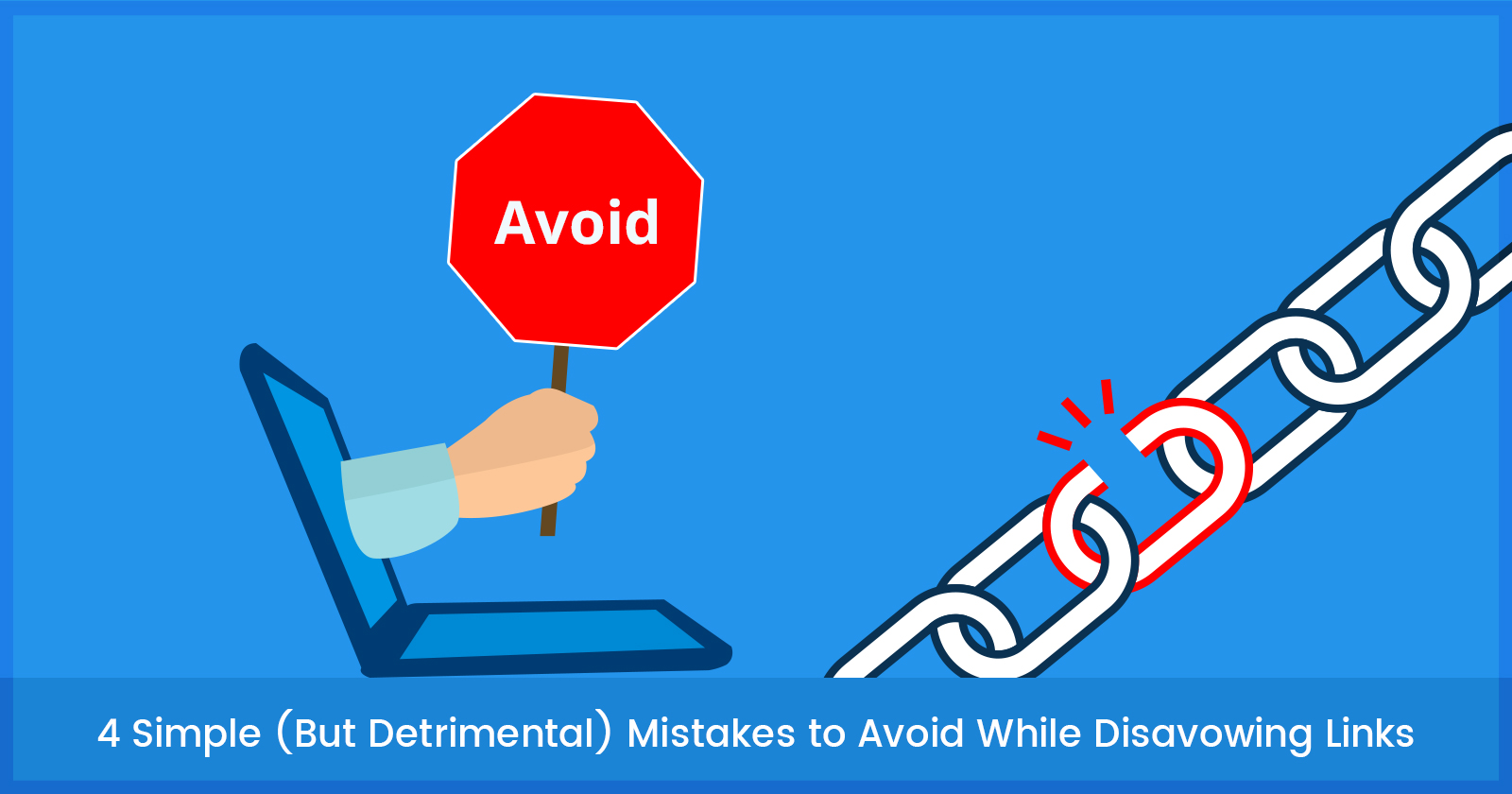The process of disavowing links is a heavily debated topic in the SEO world.
Perhaps the biggest question revolves around whether it’s still worth doing – given the modern age of Google and advancements in AI-fueled algorithms.
We recently had the privilege of hosting Dr. Marie Haynes on our company podcast, The Marketing Microscope.
In this episode, Haynes gave us a great deal of insight on disavowing links, the importance it has, some good tidbits on how to carry out the task, and more importantly for the nature of this post, some key mistakes to avoid making.
Without further ado, let’s talk about four seemingly small mistakes that can kick up a lot of dust when disavowing links.
1. Jumping to Conclusions Too Quickly After an Update
First and foremost, disavowing links needs to be done with a certain mindset.
In the unfortunate scenario that a business website takes a hit after a Google Update, re-evaluating the inbound links is a logical move to make.
However, a big mistake to avoid is making ill-planned, rash decisions. This can definitely be tough in the heat of the moment…
Truth be told, we’ve seen companies get hit by a Google Update, then go crazy about disavowing links; almost as if they are afraid of ALL links. If you go down this route, it’s likely that you will end up disavowing links that are actually helping your website rank.
Always remember, disavowing links is a last resort!
Another big mistake Haynes mentioned is that many people are too quick to trust link auditing tools. These tools programmatically upload the links they deem “toxic.” In some cases, this can result in you disavowing good links.
Haynes mentioned that she’s seen people blindly disavow valuable links from sites like BBC and The Guardian simply because some tool told them to!
A good rule to remember with link auditing tools is if they tell you to disavow a certain link, chances are, Google isn’t paying attention to that link anyway.
Before you make any decisions, you need to take the time to review the benefits/risks attached to detoxing every single link. Unless you have a background in SEO and stay updated on how Google and other search engines are evolving, it’s highly recommended to consult a professional.
Jumping to extreme conclusions can potentially cause irreversible damage!
2. Being Too Lenient
If there is one thing to engrain in your mind about how Google deems a link “valuable,” it’s relevancy.
Let’s say you run a hair salon.
Getting inbound links to your website from beauty blogs, fashion blogs, and travel blogs (depending on the topic) could all be relevant links to help boost your site’s rankings.
On the flip side, a bunch of links from auto blogs, architecture blogs, horse racing blogs, websites in a different language, and so on would not likely do much for your rankings.
This is why you shouldn’t welcome any and all inbound links.
Additionally, the quality of the linking website and contextual importance your site has within the content plays a role in the value it passes.
When you’re just starting out with a new site, it might be tempting to hold onto every link. As a result, you might find yourself making exaggerated connections to justify keeping them.
As Haynes put it in the podcast, “The links that you should be disavowing are the ones you would be terrified to show Google and say ‘hey, we made these links!’”
If you are considering disavowing (or not disavowing) a link, take some time and look over the site. This is where you will need to be very critical.
If you’ve got an inbound link to your hair salon website from a piece of content giving gambling tips, there is probably little-to-no relevancy, which in turn, can potentially compromise your site’s rankings.
Now, differentiating which links are adding value to your site (and which ones aren’t) is not always apples-to-apples. Which leads me to my next point…
3. Failing to Recognize a ‘Bad’ Link
To expand on the previous section, identifying a “bad” link to disavow might require some investigation.
According to Haynes:
“Most sites these days probably don’t need to file a disavow. There is a lot of misinformation out there; information that was right a few years ago, but not correct today.
For example, if all of the sudden you saw a bunch of porn-related links, there is no harm in disavowing those. But those are not the types of links you need to disavow. Google is now very good at figuring out that you probably didn’t build a bunch of adult links for the purpose of improving rankings.”
One of the most interesting tidbits we got from Haynes was about the patterns she’s seen as to when disavowing links is beneficial. This commonly relates to non-contextual links built in guest posts.
Now, this has been a bread-and-butter strategy in SEO for years.
Ultimately, the value of the link can be attributed to the value it provides within the content.
If you’ve built a ton of links to your website across the web that don’t meaningfully recommend your business, but were merely placed for the sole purpose of link building, this can potentially cause problems.
So what exactly is a “bad” link?
Bad links can come in all shapes and sizes.
Whether it’s a non-contextual link, one on a cheap directory site, or one that holds no relevance to your website, these low-integrity links can hurt your rankings if they go unchecked.
Here are three common types of links that would likely be good disavow candidates:
Link Schemes
If it’s obvious that you’ve built links purely for the purpose of ranking or making money, this can get you into trouble – per Google’s Webmaster Guidelines.
Non-Editorial Links
These refer to links that you control, but didn’t intentionally place. This would include links related to widgets, signature spam, forum spam, etc.
Links with Commercial Anchor Texts
Having your links tied to anchor texts with blatantly commercial keywords – like “best CRM software”, “real estate for sale”, etc. can potentially cause issues, even if the inbound link itself is super relevant to your website!
Ultimately, the most important thing is it should not be blatantly obvious that you built the link for the sole purpose of SEO. Every link you build should have contextual value to the content it lives on.
4. Swearing off Link Building After a Penalty
Completing the process of getting rid of bad links, cleaning up your backlink profile, and putting the penalty in the rearview mirror is a good feeling.
However, it shouldn’t mean that you swear off link building forever. This is a mistake we see all too often.
Even if you aren’t doing any sort of link building, you can still receive toxic links. Moreover, a previous “good” link may be deemed a “bad” link in future updates.
If you’re not actively building new, good-quality links, you’re essentially omitting a key component of SEO – meaning you aren’t doing yourself any favors. In fact, link signals make up nearly 20% of ranking factors for local SEO.

To keep improving your rankings, the important thing is that you are learning from your situation and continuously working to build high-quality links.
Link building shouldn’t be a scary thing – even if you got burned after an update.
At the end of the day, the disavowing process should be an educational experience that gives you a better understanding of what exactly defines “good” and “bad” links to your website.
Summary
Disavowing links is an interesting job these days.
Google (and the rest of the web) is constantly changing. A key takeaway here is that search engines are getting better and better at figuring out who is trying to “game” the system with bad SEO for their own benefit.
Hopefully, this post has given you a better idea of the key mistakes to avoid in the disavowing process (and how easy they can be to make).
More Resources:
- How Negative SEO Shaped Disavow Tool
- Should You Disavow a Link That Sends Lots of Traffic?
- Google’s John Mueller on How to Use Disavow Tool – Two More Times
Image Credits
Featured Image: Created by author, October 2019
Screenshot taken by author, October 2019




